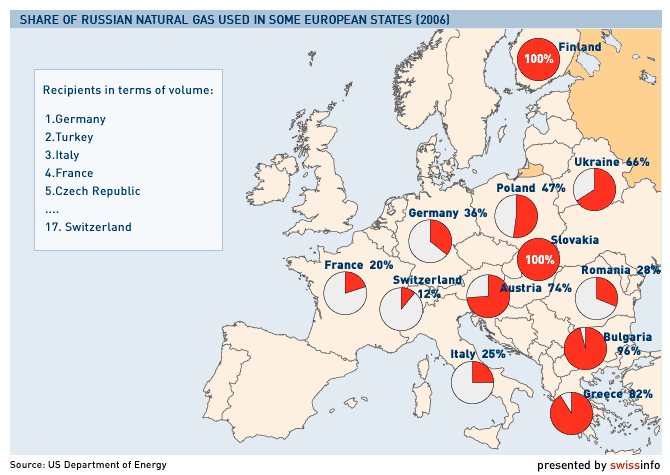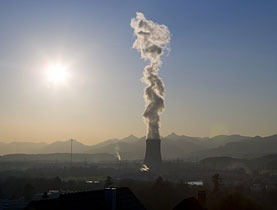Switzerland insulated from Russian gas dispute

As the list of European countries left without Russian fuel grows, the purchaser for the Swiss gas industry anticipates no restrictions to Swiss supply.
But Switzerland has been asked to help ensure supplies to other countries and assist diplomatic efforts to resolve the crisis. The government is expected this month to consider two formal requests for help.
There is little sign of a swift resolution to the pricing dispute between Russia and Ukraine, while freezing mid-winter temperatures across Europe are adding to demand.
Although Switzerland uses some Russian gas for its domestic needs, Ruedi Rohrbach of Swissgas, which imports three-quarters of the gas used in Switzerland, said there were no direct supply contracts with the Russian gas firm Gazprom.
Imported natural gas meets 12 per cent of Switzerland’s energy requirements. Most of the imported gas is secured in the form of long-term supply agreements with European Union partners – Germany, the Netherlands, France and Italy.
According to the Federal Energy Office, these countries, with the exception of the Netherlands, import most of their gas requirements from Russia, Norway and Algeria.
Rohrbach denied Switzerland would be exposed to a knock-on effect of restricted gas supply if the suppliers decided to satisfy their own domestic markets first.
“No the risk is not there. Not only us, but other clients in other countries have long-term supply contracts with these suppliers. These are large, established, West European companies, active throughout Europe and even worldwide,” he told swissinfo.
“These [companies] have no prioritisation, contractual or otherwise, in the supply to their clients. All clients are treated the same, regardless of what country they are based in. This has been explicitly confirmed to us.”
Gas spat
The government confirmed on Wednesday that it had received two separate appeals for Switzerland to intervene in the dispute, which could be considered at the next cabinet meeting next Wednesday.
A Ukrainian diplomatic representative requested help from the Federal Energy Office and the State Secretariat for Economic Affairs in presenting their view of the situation.
Meanwhile RosUkrEnergo, a Zug-based firm part owned by Gazprom and two Ukrainian partners, sent an open letter to the Swiss cabinet asking for political support in ensuring the free passage of gas destined for Europe.
The company is at the centre of the dispute between the Ukraine and Russia, since technically it is responsible for supplying gas to Ukraine, and is owed $3.2 billion (SFr 3.5 billion) by Kiev.
The dispute between Moscow and Kiev over debts and gas prices has slashed Russian natural gas supplies to the European Union, which gets a quarter of its gas from Russia, 80 per cent of it through Ukrainian pipelines.
Moscow began reducing volumes to Ukraine on January 1 after failing to reach an end-of-year agreement. As the dispute entered its second week, many countries saw their Russian supply cut off completely.
European suppliers are better prepared for this disruption to Russian supply than when Gazprom shut pipelines in 2006. At that time supply to Europe fell by up to 40 per cent.
Since then the main consumers of Russian gas have built up reserves that will cover their needs for several months.
Trading blame
Both sides are blaming each other for the interruption in supply. Russia has accused its former Soviet neighbour of stealing about 15 per cent of the gas it ships across Ukraine to European states.
“The rates of unauthorised withdrawal of the Russian gas intended for European consumers are growing in Ukraine,” a Gazprom spokesman said on the company’s website.
Meanwhile Ukraine’s President Viktor Yushchenko blamed Moscow for the supply disruptions, saying Moscow would continue to close the gas taps to Europe.
So far eastern and central Europe have borne the brunt of the row and Rohrbach said the strategy of diversification was paying off for Switzerland.
“The supply of natural gas to Switzerland is in no way dependent on supplies from Russia,” he said.
swissinfo
Russian gas supplies to Austria, Slovakia and the Czech Republic were halted on Wednesday.
Bulgaria spoke of “a crisis situation” and cutting or suspending supplies to industrial users.
France and Italy also reported a steep drop in supplies but the euro zone’s major economies have so far escaped any economic repercussions.
German energy provider E.ON Ruhrgas said drastic cuts and a prolonged cold spell could cause shortages.
The European Union gets a quarter of its gas from Russia, 80 per cent of it via Ukraine.
In Switzerland gas consumption rose sharply between 1970 and 1996, gaining ground as a component in Switzerland’s energy mix. But in the past decade the growth rate slowed considerably.
In 2007 Switzerland used 34 million kilowatt hours of natural gas. This amounts to some 12 per cent of the country’s energy needs.
Swiss natural gas consumption is low in relation to the rest of Europe and is equivalent to that of the German city of Hamburg.
Three-quarters of the gas used in Switzerland is purchased through Swissgas, the rest through the four regional gas companies.


In compliance with the JTI standards
More: SWI swissinfo.ch certified by the Journalism Trust Initiative











You can find an overview of ongoing debates with our journalists here . Please join us!
If you want to start a conversation about a topic raised in this article or want to report factual errors, email us at english@swissinfo.ch.